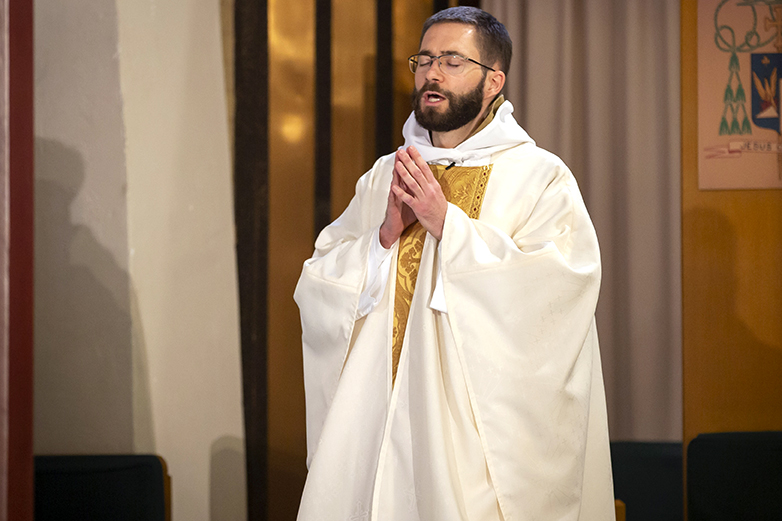
In the tradition of the great Desert Fathers of antiquity, Fr. Eugene Florea was consecrated and professed temporary vows (first vows) as a hermit in the Diocese of Phoenix.
Now known as Fr. Eugene Mary of the Trinity, he professed his vows of poverty, chastity and obedience — in the Carmelite tradition — to Bishop Thomas J. Olmsted at Ss. Simon and Jude Cathedral, Dec. 1.
The spiritual chants and hymns served to center the hearts of family, friends, brother priests and the consecrated who witnessed his entrance into eremitical life.
“He is answering Jesus’ call to a stricter withdrawal from the world to live a contemplative life of prayer, solitude and silence,” Bishop Olmsted said, who acknowledged the difficulty of listening to God when “surrounded by a culture of noise.”
“For a person whom Christ calls to be a hermit, these words are repeated with joy and confident expectation,” the bishop said, referencing the first reading from 1 Samuel 3:1-10, “Speak, Lord, your servant is listening.”
“And a hermit who faithfully lives his vocation gives courage to the rest of us to say those same words.”
The morning Mass was particularly poignant as it fell on the memorial of a French priest and hermit who ministered to the Tuareg people of the Sahara Desert and who died in 1916 — Blessed Charles de Foucauld.
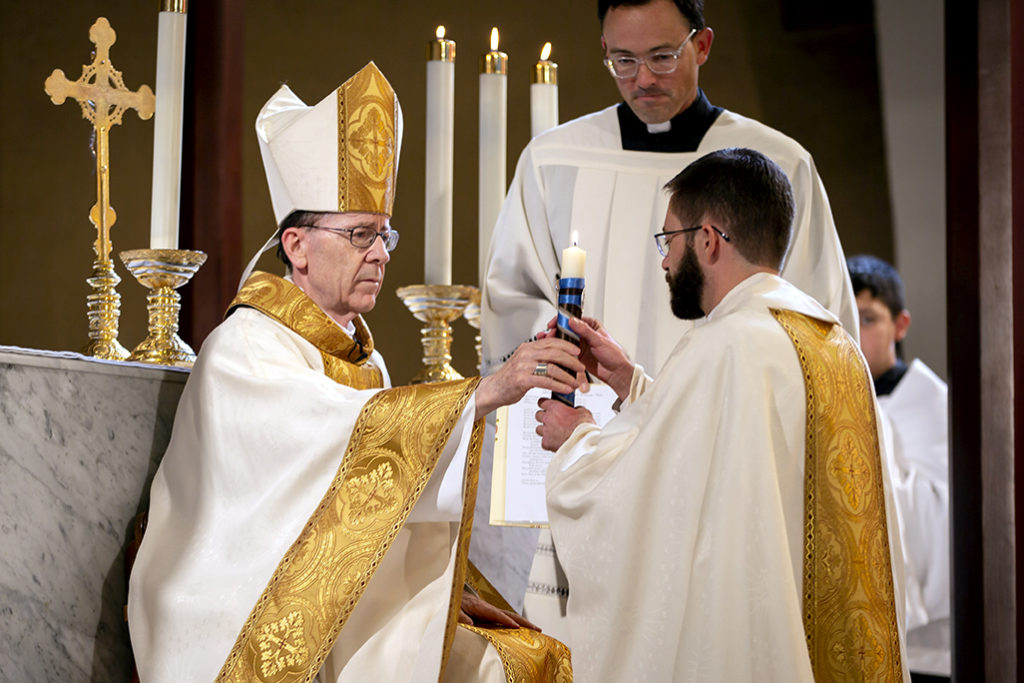

“I am overwhelmed with joy and gratitude,” Fr. Eugene Mary of the Trinity said at his reception, adding, “It was important for me to make my vows on the memorial of Bl. Charles because he had a very unique vocation as a hermit who sought to live a very simple and poor yet ordinary life …. He was deeply united to the heart of Jesus and was very present and close to the people around him.”
During the profession of vows, the priest received a lit candle from Bishop Olmsted and, kneeling before the altar, professed his vows and recited his new name — Fr. Eugene Mary of the Trinity.
His profession was followed by silence as he signed the Formula of Profession on the Altar, and was then presented his habit and mantle as a reminder of his “public profession to the eremitical life.”
His older brother from Kingman, Andrew Florea, attended the Mass with family and said his vocation came early.
Calling him his “best friend,” Andrew said his earliest memory of his brother was practicing saying Mass on a tray table at 8 years old. “It’s natural for who he is,” he said.
His mother, Ellen, agreed, saying, “It’s something he’s always wanted. We are very proud. He is a very dedicated priest.”
It may surprise people to know that the Merriam-Webster definition of a hermit as a “recluse” does not define the “unique” vocation of Fr. Eugene Mary of the Trinity.
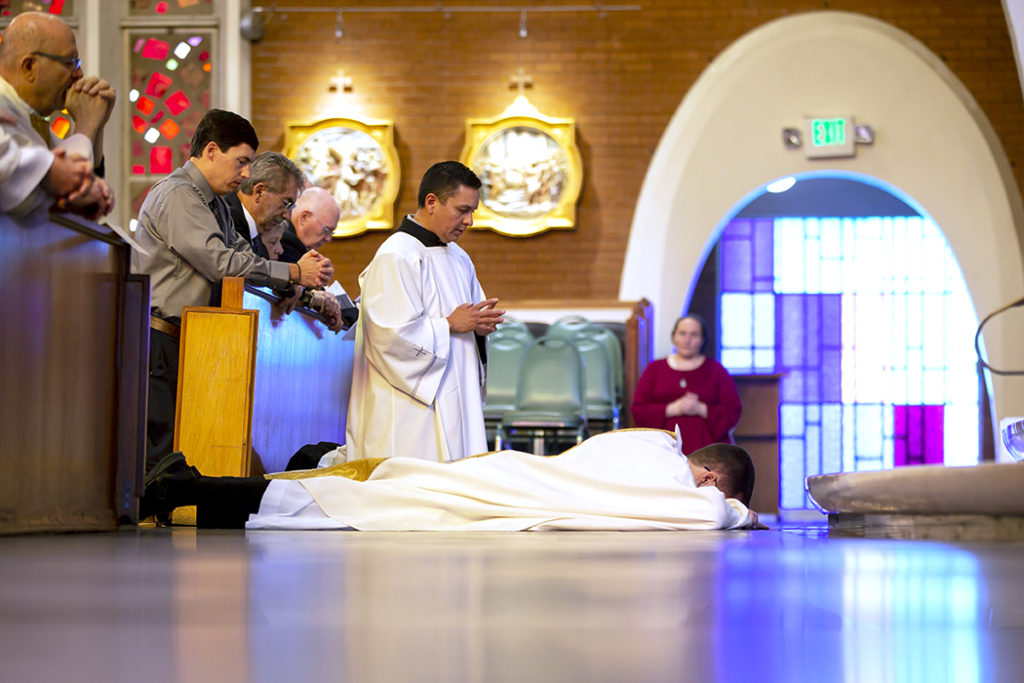

“When most people ask me about being a hermit, they imagine that I live in a cave or a hut way out in the desert and that I never see or talk to anyone, but that is far from the truth,” he said.
His ordinary house is in the actual desert on the edge of a small town, however. “I see and talk to people almost every single day. Well, maybe only one or two people, but still.”
Not unlike Bl. Charles, Fr. Eugene Mary of the Trinity said he desires to “embody the Heart of Jesus and let His love radiate through me to all the world.”
Bishop Olmsted reminded the faithful that a hermit “fulfills a vital mission in the Church’s battle against Satan by the primacy of prayer and penance in his life.”
After all, it was Jesus who said some evils can be driven out only by prayer and fasting.
“At a time when spiritual reform within the clergy is badly needed, when reparation for sins of clerical sexual abuse is urgent, God is calling Fr. Eugene to this ascetical way of life and to the ministry of strengthening the interior lives of priests by offering spiritual direction and individually directed silent retreats,” the bishop said.
Fr. Eugene Mary of the Trinity’s primary apostolate as a hermit is prayer. However, he will continue to serve as a priest, serve as director of the Merciful Heart Hermitage and, on a limited basis, assist at St. Philip Benizi Mission in Black Canyon City.
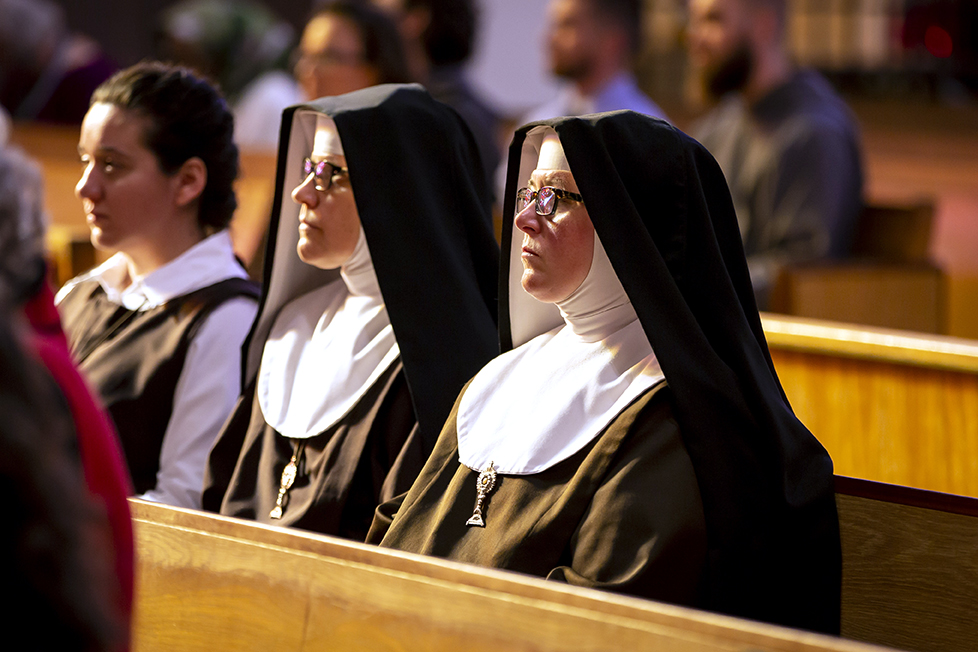

Fr. Benedict Mary Lieb of the Franciscan Friars of the Holy Spirit said he had been praying, encouraging and supporting Fr. Eugene Mary of the Trinity’s vocation since meeting at the hermitage for a prayer experience.
“Fr. Eugene helped us spend time in prayer and we developed a relationship,” he said. “A way to understand his vows is it is a unique call of consecrated life that’s not in community.”
Additionally, he will continue serving as director of spiritual formation for the Office of the Permanent Diaconate and as the spiritual director with the Institute for Priestly Formation.
Dcn. James Trant, diocesan diaconate director, described the morning as a “once in a lifetime experience.”
“It was a very blessed moment in our Church,” he said, “just beautiful.”
Fr. Eugene Mary of the Trinity said it wasn’t long after his priestly ordination in 2007 when he began to experience “a call to the contemplative life.”
Although he derives great pleasure from administering the sacraments and serving the people, he was feeling drawn to spend more time before the Blessed Sacrament.
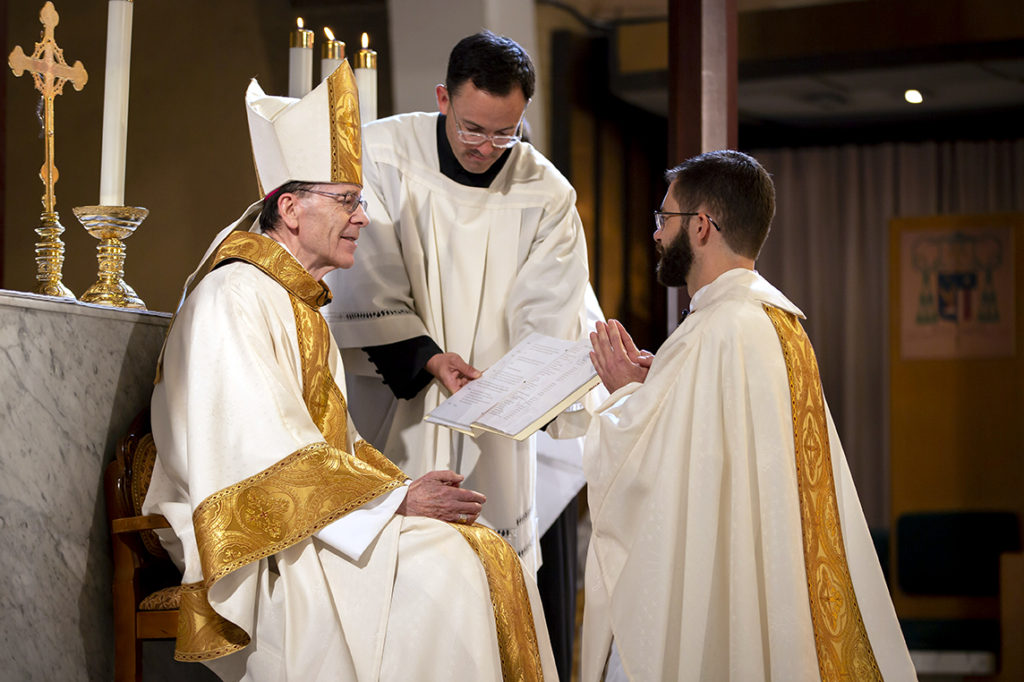

“The hunger for prayer in silence and solitude was so strong that it led me to consider … the possibility of a call to the monastic life.”
Simultaneously, Fr. Eugene Mary of the Trinity was captivated and his heart “captured” by the spiritual writings of some of the Carmelite saints.
After discerning for several years with brother priests, spiritual directors, other hermits and the bishop, he was invited to consider the possibility of living a contemplative life in the diocese.
Fr. Eugene Mary lived on diocesan-owned property in Black Canyon City, which was formerly a small retreat house and was at one time the temporary home of the Poor Clares of Perpetual Adoration.
What emerged through prayer and conversations was the idea of living as a diocesan hermit while also welcoming priests to spend time in prayer.
On May 21, 2013, the Merciful Heart Hermitage: A House of Prayer for Priests, was canonically established as an oratory in the diocese by Bishop Olmsted.
The hermitage provides priests and candidates to the priesthood the silence and solitude needed to enter more deeply into the heart of Jesus.
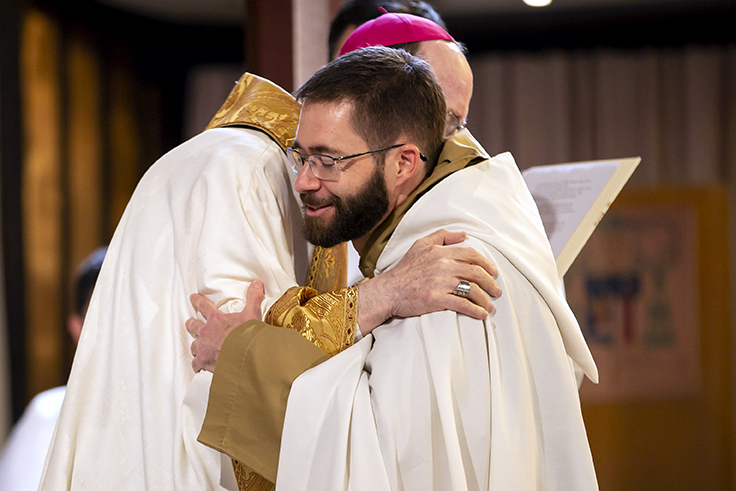

Fr. Eugene Mary of the Trinity explained St. Anthony of the Desert was one of the earliest hermits, hearing an inner call to give away all of his possessions in order to dedicate himself to prayer, asceticism and conversion.
This was the beginning of the religious life.
Soon, other men were drawn by his example and began to live near him. As hermits began to group together, monasteries were eventually built.
But there were always some who felt called to remain in total solitude as hermits.
After dying out a bit in subsequent centuries in the Western Church, but remaining vibrant in the Eastern Churches, the Western Church saw a resurgence of interest in the eremitic life after the Second Vatican Council.
In 1983, when the Church promulgated a new Code of Canon Law, the Code included a canon that specifically recognizes diocesan hermits (Canon 603).
Sr. Anthony Mary Diago, RSM, director of the Office of Consecrated Life, has known Fr. Eugene Mary of the Trinity for several years, and has prayed for his vocation.
She captured his personality when she said, “He’s very loving and joyful in the Lord because Jesus is the cause of his joy and hope. I always feel Christ’s presence when I’m with Fr. Eugene Mary, and I feel he always sees the best of everyone.”





